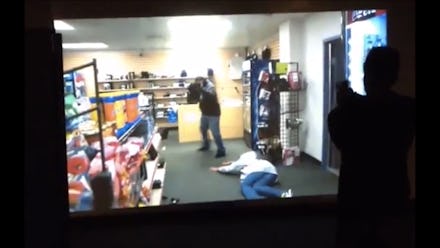Science Shows What Happens When a Normal Person Handles a Deadly Situation With a Gun

Shortly after the shooting in Newtown, Connecticut, that left 26 people dead, including 20 children, National Riffle Association executive vice president Wayne LaPierre said, "The only way to stop a bad guy with a gun is with a good guy with a gun."
But new research from gun experts at Mount St. Mary's University examined just how effective any average "good guy with a gun" can be. They found that when it comes to effective self-defense with a firearm, there's a gap between certain gun rights rhetoric and the facts.
The study, commissioned by gun reform group National Gun Victims Action Council, placed people with varying levels of gun expertise in a firearms simulator and taped how they acted in self-defense when confronted by virtual armed criminals.
After 77 volunteers, including police officers, had passed through the test, the researchers concluded that the less training and familiarity with firearms each possessed, the more stressful they found the experience and the more likely they were to fail the scenarios.
In the first scenario, a car-jacking simulation, a police officer drew his weapon quickly, kept it trained on the target and only fired when the simulated criminal moved to pull out a pistol.
A civilian waited too long and got shot dead.
In another scenario, an officer was able to successfully take down one of two criminals in a simulated convenience store robbery and compel the other to surrender, waiting until all unarmed individuals were out of the way to open fire.
A civilian got the drop on one robber, but was shot dead by his Kalashnikov-wielding comrade.
Finally, in another scenario involving a man who appeared to be engaged in larceny, an officer did not discharge his weapon when the suspect fled.
A civilian unnecessarily opened fire, missing the suspect but endangering the suspect's life.
According to the study authors, the results suggest there's a lot more to defusing a situation than just simply having a gun. "Those participants with less training and experience lack a realistic sense of what can and should be done in these stressful scenarios," the authors wrote.
These concerns are elevated, according to the study, by the facts that "roughly 22 million Americans — 8.9% of the adult population — have impulsive anger issues and easy access to guns, 3.7 million of these angry gun owners routinely carry their guns in public, and very few of them are subject to current mental health-based gun ownership restrictions."
The study also warned that expansive gun rights laws allow people with little training to carry firearms for which they simply don't have the skills to use in self-defense.
"We gave these civilians firing a tremendous edge in that the conceal and carriers walking around with guns have them holstered ... here, in this test, the carriers already had the guns out," National Gun Victims Action Council CEO Elliot Fineman said in a phone interview with Mic. "In other words, they didn't have to lose any time reaching for their holster, and yet they failed miserably in trying to defend themselves."
Fineman said current training requirements for firearms ownership were "pathetic" and noted "currently, Kansas and four other states have had their legislators pass laws [that allow citizens to] walk around with a gun without any permit and any training at all." Nine other states are seriously considering similar legislation, according to Fineman.
"Think of an athlete," Fineman said. They develop "a great level of skill and if they stop practicing, they lose it. ... If we're gonna let people walk around with guns to defend themselves, then they're going to have to be trained and maintain that training level."
"One of the reasons we conducted this study was to be helpful to legislators, to help them rely on facts and evidence instead of myths," Mount St. Mary's University Criminal Justice Program director and study co-author Joe Vince told Mic via phone.
Vince compared firearms training requirements to seatbelt laws and licensing requirements for drivers, saying in both of those instances legislators were eventually compelled to institute stricter regulations across the country.
"What we have now obviously isn't working," he said. "If we continue down this path, we're going to continue to get the same results ... [we have to] get rid of the ability for people who shouldn't have guns to have them."
h/t Washington Post